(CNN) -- It was the most
ambitious and the deadliest terror attack since
the rampage by Pakistani militants through Mumbai five years ago. And
it raises the alarming prospect that al Qaeda affiliates and other
jihadist outfits could turn parts of northern and western Africa into
no-go zones -- places too dangerous for Westerners to work, or even
visit.
The attack on the In
Amenas gas facility left 37 foreign workers dead, according to the
Algerian prime minister. It showed that al Qaeda-linked groups now have
the resources to reconnoiter and launch complex attacks against places
far from their strongholds, using a network of camps and intermediaries
throughout the desert.
If their rhetoric is to
be believed, their goals include targets farther afield -- leveraging
sympathizers among the vast North and West African diaspora in Europe.
A spokesman for the man
who orchestrated the attack, Moktar Belmoktar, told French media Monday
that France would see "dozens like Mohamed Merah and Khaled Kelkal."
Merah shot dead seven people in Toulouse, France, last year; Kelkal
carried out a series of attacks in France in 1995.
Oil companies reassess risk
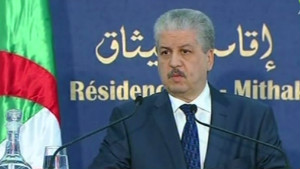 Algerian PM: 37 hostages killed
Algerian PM: 37 hostages killed
 Algerian PM: 37 hostages killed
Algerian PM: 37 hostages killed
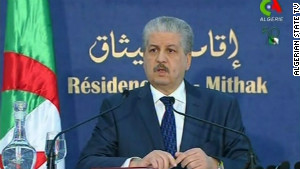 Algeria PM: Facility was booby-trapped
Algeria PM: Facility was booby-trapped
 Family of slain hostage seeks answers
Family of slain hostage seeks answers
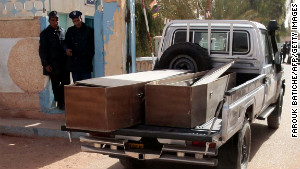 Obama's hostage crisis response
Obama's hostage crisis response
The most immediate
concern to counterterrorism analysts is that Belmoktar will launch more
attacks against Western companies in North Africa. A second attack on
oil and gas infrastructure could cause foreign oil companies to reassess
their exposure in Algeria, Libya and parts of West Africa, or at least
raise the security costs of doing business in the region.
A former head of
intelligence for the Transitional National Council in Libya, Rami El
Obeidi, told CNN last week that with the French intervention in Mali, "a
Pandora's box has been opened," and he believes oil fields in Libya are
also at high risk of being attacked.
Geoff Porter, a longtime
observer of events in North Africa, says a mass exodus of Western
companies from Algeria is highly unlikely. But, he said, "the Algerian
hydrocarbons sector will enter a holding pattern for the next month or
so, possibly resuming meaningful activity at the beginning of March."
"Companies looking at
potential opportunities in Algeria will now look not only at the
available acreage's prospectivity, but also how its location impacts
security concerns and associated costs," Porter added.
Belmoktar, the leader of
a newly formed Saharan al Qaeda franchise that split from al Qaeda in
the Islamic Magrheb (AQIM) last fall, remains at large, likely hunkering
down in northern Mali, where he is believed to have amassed weapons and
a war chest of millions of dollars from ransom payments and smuggling.
Belmoktar has been based
in or near the town of Gao, where endless tracts of desert as well as
cave complexes have been a safe-haven for a variety of militant groups
affiliated with al Qaeda since armed Islamist rebels drove out
government forces early last year.
Last month he announced the formation of a new commando unit called Those Who Sign with Blood.
"He has all the
resources he needs in terms of money, weapons and soldiers to launch new
attacks, and his recruitment and fundraising efforts will likely be
boosted significantly because of the attack," said Noman Benotman,
himself a former Libyan jihadist who is now a senior analyst at the
Quilliam Foundation in London.
Complex attack
Belmoktar became known
as "Mr Marlboro" because of his smuggling enterprises. But Robert
Fowler, a Canadian diplomat who was held for 130 days after being taken
hostage by Belmoktar in 2008, said he had no doubts about where
Belmoktar's priorities lay.
"His men were amongst
the least materialistic I ever encountered. His criminality always
served the expansion of jihad," he told CNN.
According to Benotman
and other sources, the leader of the Algerian attack was Taher Ben
Cheneb, the Algerian head of The Movement of Islamic Youth in the South.
In his 50s, Cheneb was a longtime associate of Belmoktar. Cheneb was
supported by Abdul Rahman al Nigeri, from Niger, and another Algerian,
Abou al Barra.
The unit Belmoktar
dispatched was well-armed: heavy machine guns, assault rifles,
rocket-propelled grenades, mortars and explosives were recovered from
the scene. And eyewitness accounts suggested the group or supporters had
undertaken advance surveillance because it was apparent the attackers
were familiar with the sprawling facility.
U.S. officials and North
African sources believe the attackers entered Algeria from Libya and
that some may have been trained in jihadist camps in southern Libya, not
far from the In Amenas gas facility. The sources tell CNN that Libyan
authorities are aware of three jihadist camps south of Sabha providing
instruction to militants from North Africa and the Sahara, but have
lacked the capability or will to move against them.
According to one source, Belmoktar visited the commandant of one of these camps on a trip he made to Libya in late 2011.
Benotman says the first
phase of the assault involved an attempt to hijack a bus carrying
Westerners as it traveled to the local airport. This would have required
advance knowledge of travel arrangements. Benotman told CNN that in the
view of regional security officials, the attackers likely received some
insider help -- they also knew which units at the facility housed
foreign workers.
Algerian Prime Minister
Abdelmalek Sellal said Monday insider knowledge was passed on by a Niger
national who had previously worked as a driver at the facility.
"If there was an 'inside
man,' then this has certain implications for due diligence and vetting
of employees at other oil and gas sites," according to Geoff Porter, who
runs North Africa Risk Consulting Inc.
The attackers' plan,
according to Benotman, was likely to take hostages from the bus across
the nearby border into Libya, although he said it is possible their
final destination could have been another neighboring country, such as
Mali.
But the intervention of
Algerian forces prevented their escape. The second part of the plan
appears to have been to threaten to kill the workers if the Algerians
tried to storm the complex.
"If the attack was a
genuine attempt to seize hostages, then this raises the likelihood that
there will be another attempt at another facility," Porter said.
"The same implications
apply if the goal was to destroy the facility. If, however, the attack
was a 'spectacular' aimed at raising the profile of Moktar Belmoktar in
the Sahara, which appears to be the most likely interpretation at this
point, then the likelihood of it being repeated is lower," he added.
A jihadist spring
The attack on the
Algerian compound involved fighters from across North Africa and the
Sahara, according to Algerian authorities, including from Egypt, Mali,
Niger, Mauritania, Tunisia and Algeria.
"Belmoktar's group in
particular appears to have evolved -- they've been able to attract a
more diverse group of foreign fighters than before, and that's a
reflection of how other jihadists see them," said Andrew Lebovich, a
Senegal-based security analyst.
Several other jihadist
groups have also expanded, including factions of AQIM, a hotchpotch of
jihadist militias in Libya, and the Nigerian militant groups Boko Haram
and Ansaru. A variety of North African and Saharan jihadists and even
some Nigerian militants appear to have received training in northern
Mali, according to Lebovich, with different groups in the region
"cross-fertilizing."
Sources monitoring the
security situation in eastern Libya say that, if anything, it has
worsened since the attack on the U.S. diplomatic compound in Benghazi in
September, with a series of assassinations and attempted assassinations
of security officials, many of which are blamed on Islamist militants.
Libyan authorities are
aware of several jihadist camps providing instruction to Libyan
militants and foreign fighters in the Derna and Benghazi region, but
have not had the firepower to move against them. According to Western
intelligence officials, a leading jihadist operating in the area is
Abdulbasit Azuz, dispatched to Libya in 2011 by al Qaeda leader Ayman
al-Zawahiri.
The Nigerian group Ansaru claimed responsibility for an attack that killed Nigerian troops heading to Mali on Sunday.
"We are warning the
African countries to (stop) helping Western countries in fighting
against Islam and Muslims or face the utmost difficulties," the group
stated. Last year, White House counterterrorism advisor John Brennan
warned that Ansaru was committed to transnational jihad.
Terrorism analysts
believe that following the Algeria attack and the French military
operation in Mali, these groups may be inspired to launch attacks
against Western interests in the region.
"Fighting against local
governments didn't help them. It didn't create the euphoria they needed.
But now they have this foreign element: an invasion, the West,
Crusaders giving them a sense of meaning and a cause in exactly the way
Osama bin Laden envisioned," Benotman told CNN.
In recent days, Benotman
said, hardline Salafist preachers across the Arab world have declared a
call to arms against the French military intervention, depicting it as a
foreign occupation.
Long-term challenge
Western governments are under no illusions regarding the challenges that lie ahead in the region.
"It will require a
response that is about years, even decades, rather than months, and it
requires a response that is patient, that is painstaking, that is tough,
but also intelligent," British Prime Minister David Cameron said
Sunday.
Although in the long
term the Arab Spring may discredit al Qaeda's violent ideology, jihadist
groups have taken advantage of political turmoil and the dismantling of
security services in North Africa to build up their operations.
Over the past two years,
al Qaeda has shifted its center of gravity from the
Afghanistan-Pakistan border region where it is under pressure from drone
strikes toward the Arab world, green-lighting the return of dozens of
Arab operatives to their homelands, according to Western intelligence
officials. The emergence of Syria as a new jihadist cause celebre has
further energized militants.
In announcing the
formation of the commando unit in December, Belmoktar had promised
attacks on Western interests in the region and the home soil of Western
countries if they moved against jihadists who had taken over northern
Mali.
The fact that some of
the attackers in Algeria were carrying Western identification -- two of
them were reportedly Canadian -- will raise concern that the group could
retask such recruits to launch attacks in the West.
Algerian Prime Minister
Sellal said Monday a Canadian national known only as Chedad had played a
coordinating role in the attack.
"French security
officials have publicly said for some time that they are especially
concerned that Westerners could come back from North Africa or the Sahel
to launch attacks," Lebovich told CNN. The Sahel is the area along the
southern edge of the Sahara.
So far, neither
Belmoktar's group nor any other al Qaeda faction in North Africa has
come close to launching a terrorist attack in Europe. Virtually all the
AQIM cells dismantled in Europe were focused on logistics and
fundraising rather than plotting terrorist attacks, according to
European counterterrorism officials.
Confronting this emboldened transnational jihad in north Africa is a daunting task, complicated by several factors.
One is the long-standing
lack of cooperation between North and West African countries. Algeria
and Morocco, for example, are rivals for influence. Another is competing
priorities among regional governments. Western diplomats tell CNN that
Nigeria, for example, is more concerned about the threat from Boko Haram
within than jihadist safe havens in Mali.
There is also the long
experience of operating in the desert that leaders such as Belmoktar
have, and the complex relationships between different and often
fractious groups.
Another factor is that
the United States has not developed the sort of intelligence
infrastructure in this region that it painstakingly built up in the
tribal areas of Pakistan and Yemen. In December, U.S. officials began
discussing with Algeria the possibility that it might acquire its own
satellite surveillance system to monitor terrorist movements in southern
Algeria.
Analysts warn that
however successful the first phase of the French operation in Mali, it
is likely to encounter challenges similar to those faced by U.S. and
British forces in Iraq as the campaign evolves.
"For months jihadists in
Mali have been preparing for a military intervention by creating a
network of hundreds of weapons caches and safe houses in the desert
where they've stored weapons, ammunition, and food and set up
communication channels," Benotman told CNN.
He said Belmoktar in
particular may be hard to track down. "He's a survivor -- he knows when
to go into hiding when necessary," he told CNN.
That's why French intelligence officials have dubbed him "The Uncatchable."
 Negotiators continued to demand that Dykes surrender, but authorities say the situation remained ‘static’ Wednesday. He’s also suspected of shooting 66-year-old Charles Albert Poland Jr., a bus driver in Midland City, before taking a child as a hostage from the bus.
Negotiators continued to demand that Dykes surrender, but authorities say the situation remained ‘static’ Wednesday. He’s also suspected of shooting 66-year-old Charles Albert Poland Jr., a bus driver in Midland City, before taking a child as a hostage from the bus.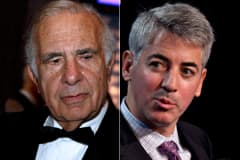
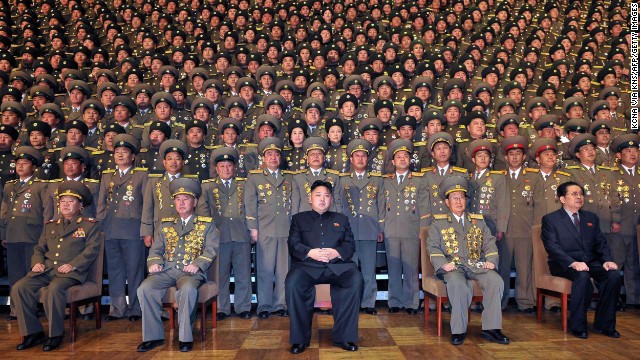 North Korean leader Kim Jong Un,
center, poses with chiefs of branch social security stations in this
undated picture released by North Korea's official news agency on
November 27, 2012. North Korea said Thursday that it plans to carry out a
new nuclear test and more long-range rocket launches, all of which it
said are a part of a new phase of confrontation with the United States.
North Korean leader Kim Jong Un,
center, poses with chiefs of branch social security stations in this
undated picture released by North Korea's official news agency on
November 27, 2012. North Korea said Thursday that it plans to carry out a
new nuclear test and more long-range rocket launches, all of which it
said are a part of a new phase of confrontation with the United States.
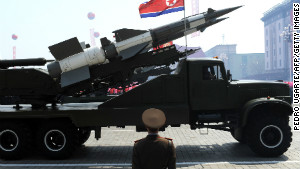
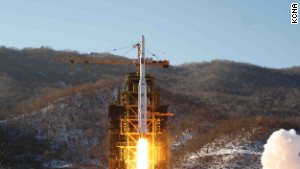
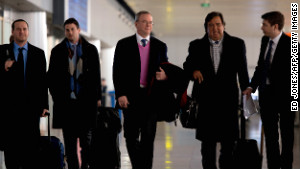
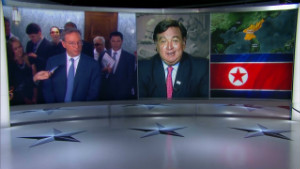





 Algerian PM: 37 hostages killed
Algerian PM: 37 hostages killed
 Algeria PM: Facility was booby-trapped
Algeria PM: Facility was booby-trapped
 Family of slain hostage seeks answers
Family of slain hostage seeks answers
 Obama's hostage crisis response
Obama's hostage crisis response